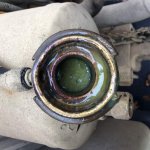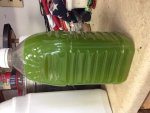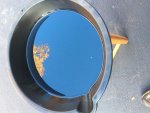I don't use pressure testers, I apply pressure using a regulator to that little hose port just below the radiator pressure cap. This way has the advantage of testing the cap in place sealed against its native surface. The radiator cap has two seals, one seals the outer lip, the other seals the inner lip. That port is between these two seals. The inner lip has a spring and will lift when internal pressure rises and sealed by the outer lip seal will be forced to vent out that small hose port. On the inside of the inner seal it also has a lightly sprung inner flapper type check valve that allows the system to draw fluid or in this case air, back in as the system cools. Applied air at that port will flow easily into the system thru that flapper and pressurize the system. You can use a little bit of paper towel or the tip of a toothpick to hold that flapper open then pressure can flow both ways. Then a gauge and a valve on that port can seal the system after pressurization and observe any leak down. Since you have blocked the port where overpressure normally escapes, you must NOT apply too much pressure(10-15PSI max, use a regulator and a gauge.).
So if you apply 10-15 PSI with a pressure regulator and pressure is leaking(if the leak is large enough you will hear air flowing thru the regulator), a couple possibilities exist.
1. It is leaking out the cap outer seal or a port or hose above the coolant level. Not many of those, so easily bubble mixed looking for air bubbles.
2. If you didn't find any air leaks, it is either airtight or it is pushing fluid somewhere. You were not loosing any coolant, so you should probably confirm this is the case. Remove some coolant from the expansion tank so the level is observable in the lower sight glass. Apply 10-15 psi to that port under the cap and watch the level over time while maintaining 10-15 PSI on the port. if you are loosing fluid it is either going to the outside and you will see a leak somewhere. To the motor oil via oil cooler or bad gasket or crack, to the fuel tank via bad cup seal, or to the transmission via bad trans oil cooler...
If you are not loosing any fluid, and cannot find any air leaks, then perhaps as suggested, your coolant is going funky and simply needs to be changed.






